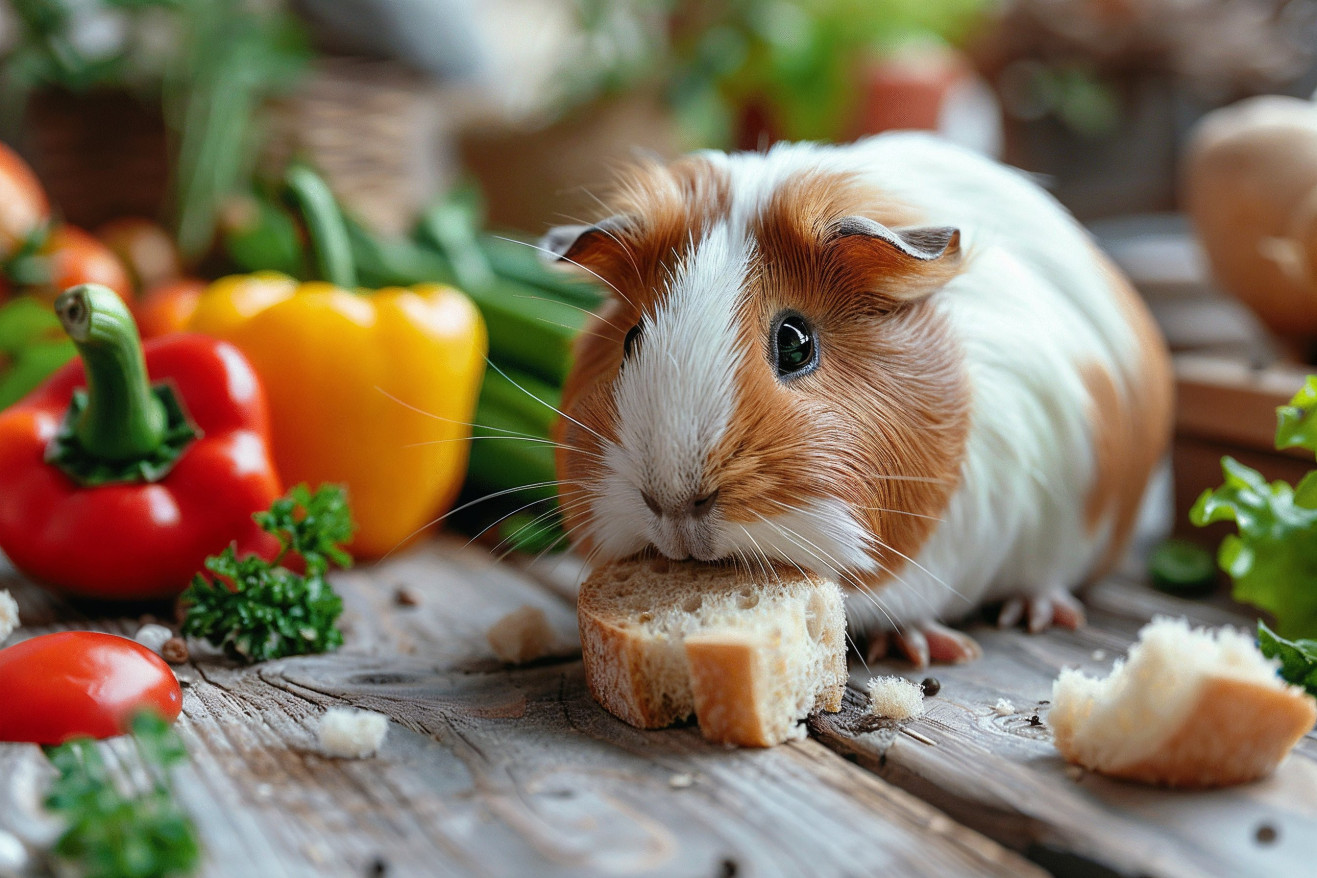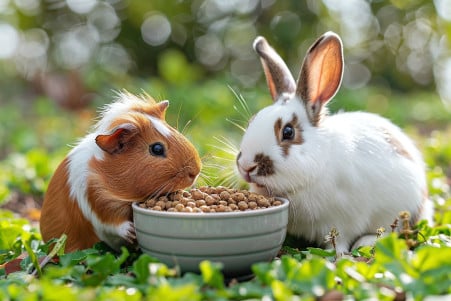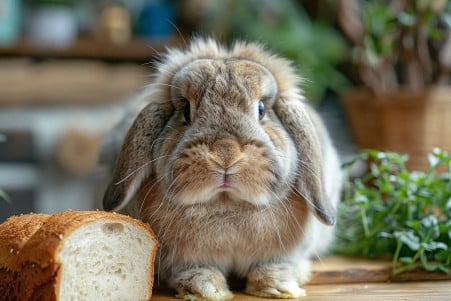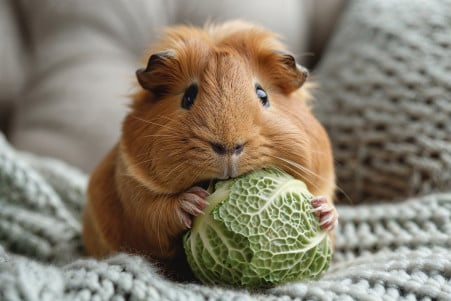Can Guinea Pigs Eat Bread? Understanding Their Dietary Needs
14 March 2024 • Updated 13 March 2024

If you’re trying to mix up your guinea pig’s diet, you might be wondering if you can toss them a piece of bread. Unfortunately, guinea pigs can’t eat bread. It’s not only low in nutritional value, but it can also lead to digestive problems. Instead, guinea pigs need a diet that’s high in fiber from hay, fresh veggies, and fruits, as well as a critical source of vitamin C to stay healthy.
This review will look at veterinary nutritional studies and animal nutrition research to find out exactly what guinea pigs need and can’t have in their diets. It will focus on the importance of fiber, the need for vitamin C, and the digestive issues that dictate which foods are healthy for these animals.
By talking to experts in rodent nutrition, we hope to explain why some common human foods, like bread, don’t work for guinea pigs.
Can guinea pigs eat bread?
Fiber: The Foundation of a Healthy Guinea Pig Diet
Dietary fiber, which is found in plant-based foods and can’t be digested, is incredibly important for a guinea pig’s health. Not only does it help with digestion, but it also helps guinea pigs grind down their teeth, which constantly grow. This is important for maintaining healthy teeth and gut health. Fresh hay and grass are high in fiber and are the foundation of a guinea pig’s diet because they help with these things.
If guinea pigs don’t get enough fiber, it can have serious consequences, including gut problems like gut stasis, which is when the digestive system slows down or stops, and dental problems like overgrown teeth, which can be painful and make it difficult for guinea pigs to eat. PDSA says that a lack of fiber can lead to these life-threatening health problems.
On the other hand, bread is low in fiber and doesn’t have the same nutritional value as high-fiber foods like hay or grass. Small Pet Select explains that bread doesn’t meet the dietary needs of guinea pigs, who need a carefully balanced diet to stay healthy.
By making sure their guinea pigs have access to high-quality hay at all times, owners can help ensure their pets live a happier and healthier life, as it meets their fiber needs.
While fiber is important, it’s also important to make sure guinea pigs get other essential nutrients, like vitamin C, to prevent deficiencies and support their health.
Vitamin C: An Essential Nutrient for Guinea Pigs
In contrast to humans, guinea pigs are unable to produce their own vitamin C and must get this essential nutrient from their diet to avoid scurvy. Scurvy can weaken the immune system, cause bone and teeth abnormalities, and slow down the healing of wounds. The Humane Society of the United States recommends that guinea pigs be fed vitamin C–rich vegetables daily, such as red or green peppers, broccoli, and dark leafy greens like kale.
Bread, on the other hand, does not contain the vitamin C that guinea pigs need. According to PetMD, guinea pigs need to get between 10–30 mg/kg/day of vitamin C in their diet, an amount that bread can’t provide because it contains so little vitamin C. As a result, relying on bread as a food source can lead to a vitamin C deficiency, which can have serious health effects.
It’s important to make sure that your guinea pigs are getting a well-rounded diet that includes vitamin C. Fresh hay-based pellets and vegetables will not only meet their vitamin C requirements but will also help ensure that their digestive and dental needs are being met, both of which are important for guinea pig health.
Coprophagy and the Guinea Pig’s Digestive System
The guinea pig’s digestive system is a marvel of natural engineering, designed to extract as much nutrition as possible from a high-fiber herbivorous diet.
One of the most fascinating aspects of their digestive system is coprophagy, or the consumption of their own feces, which allows them to get more nutrients from their food than they would if they didn’t eat their feces. This is important for their health because it helps them get the most nutrition from their food.
Their digestive system is also home to microbes that break down tough plant material to release important nutrients, and these microbes are found in the digestive tract, especially in the large intestine and caecum.
The Guinea Pig Vet explains that guinea pigs use a mucus-trap system that is less efficient than the one used by rabbits, which results in a heavier colon and reduced agility. This shows that their digestive system is specifically adapted to the high-fiber diet of hay and grass, not the low-fiber diet of bread and other refined flours.
In fact, when guinea pigs eat bread, the high starch and low fiber content can upset their digestive system, leading to problems like gastrointestinal stasis. To ensure that their digestive system works as it should, it’s important to feed them a diet that’s similar to what they would eat in the wild, which means a diet that’s primarily hay-based with some fresh vegetables and a small amount of fruit.
This will help ensure that their digestive system works as it should and that they get the nutrition they need, both of which are important for their overall health.
Carbohydrates and Starches: Impact on Guinea Pigs
While carbohydrates are an important source of energy for many animals, they are a bit more complicated in guinea pigs, especially when it comes to their ability to metabolize starches.
This is because high-carb, starchy foods, such as bread, can have a big impact on a guinea pig’s metabolism due to their lack of adaptation to efficiently process these types of foods.
A study by Hansen et al. in 2023 even showed that guinea pigs are useful for studying the impact of diet on cholesterol and lipoprotein metabolism. It has been shown that in guinea pigs, low-carbohydrate diets lower plasma triglycerides and lead to the production of fewer atherogenic LDL particles, which indicates that guinea pigs have a responsive lipid metabolism.
In addition, research has shown that carbohydrates in the form of starches can have negative metabolic impacts. For example, a study published in PMC demonstrated that a high-starch diet in guinea pigs led to weight gain and glucose intolerance, which shows that starches are not a good option for guinea pigs.
This was supported by a study in Nutrition & Metabolism, which showed that it’s important to choose the right carbohydrate sources for guinea pig diets to avoid causing negative metabolic states that are similar to non-alcoholic fatty liver disease.
These studies show that bread, with its high carbohydrate content, doesn’t align with the specific metabolic needs of guinea pigs. This lack of alignment with their metabolic needs shows that it’s important to provide a diet that meets their nutritional needs without causing unnecessary metabolic stress.
Final Thoughts on Guinea Pigs and Bread
In conclusion, based on everything we have learned about guinea pig nutrition, bread should not be a part of their diet. As PDSA emphasizes, the fiber-rich staples of fresh hay and grass are important for healthy gut and dental health. Bread, which is low in fiber, can cause digestive issues, such as constipation or gastrointestinal stasis, and doesn’t help their teeth grow as they should.
It’s also important to reiterate the need for a diet that is high in fiber and vitamin C. Since guinea pigs can’t make their own vitamin C, they can develop scurvy if they don’t get enough in their diet.
As Pet Keen recommends, while guinea pigs’ diets should be based on grass and hay, they should also eat a variety of vegetables and fruits in moderation to ensure they get enough of this important nutrient.
It’s important to feed guinea pigs a diet that is based on sound veterinary nutritional science to ensure their health and well-being. By avoiding feeding them foods like bread and instead focusing on a well-rounded, natural diet, you can help ensure that these social animals are healthy and happy. Let’s make sure we feed our guinea pigs the best diet possible so that they can be happy and healthy in our care.


